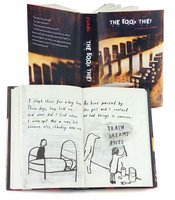 I’m not sure if I fell in love with this book because of the storyline or the author’s writing style or because it was narrated by death, which is such a unique perspective (I know, something narrated by death sounds dreadfully morbid, but it’s not).
I’m not sure if I fell in love with this book because of the storyline or the author’s writing style or because it was narrated by death, which is such a unique perspective (I know, something narrated by death sounds dreadfully morbid, but it’s not).
I didn’t read this book quickly, I slowly let it soak in, and I actually finished it a week and a half ago, but I wanted to let it ruminate in my brain for awhile before I reviewed it (plus I was on vacation for a week and a half so I haven’t been blogging).
This novel begins with Death telling the story of Liesel Meminger growing up in Munich, Germany during World War II. Liesel is sent to a foster family in Munich because her mother has been associated with the Communist Party. Her foster father, Hans Hubermann, helps Liesel in her struggle to learn to read. Soon words surround Liesel and she becomes the Book Thief.
As you might imagine, this books is filled with the tragic events of the Holocaust, but it’s also full of the details of Liesel’s everyday life. I love the reminder that even while life is full of horrors, it has moments of comedy too.
I really wish that I purchased this book instead of checking it out from the library because there were so many beautiful sections that I was dying to highlight. Zusak has such an original way of describing things. Here are a few that delighted me:
- “Frau Diller smiled. Her teeth elbowed each other for room in her mouth (pg 155)”
- “When Max heard the news, his body felt like it was being screwed up into a ball, like a page littered with mistakes. Like Garbage.
Yet each day, he managed to unravel and straighten himself, disgusted and thankful. Wrecked, but somehow not torn to pieces. (pg 194)”
I think part of the reason I was able to focus on the beautiful writing was the way it was narrated. Since Death was telling the story, the narrator already knew how everything would end and spoiled the ending ahead of time. Normally I would have hated the spoilers, but instead of rushing forward because I had to know what was going to happen, the narration allowed me to just enjoy each passage as I went along. Death even comments of this method of telling the story:
Of course, I’m being rude. I’m spoiling the ending, not only of the entire book,
but of this particular piece of it. I have given you two events in advance,
because I don’t have much interest in building mystery. Mystery bores me. It
chores me. I know what happens and so do you. It’s the machinations that wheel
us there that aggravate, perplex, interest, and astound me (pg 243).
Even though Death was only the narrator, his character intrigued me. Death was not happy about WWII, he thought it was awful. There’s a point in the story where even Death gets emotional about what happens to Liesel and after his description of the events he says, “You see? Even death has a heart (pg 242).” Death sees moments in shades of color and as he describes events he often tells the reader what color the events were. It was so intriguing to me.
All of the characters were original and I know they will each stay with me for quite awhile. I recommend that you go straight to the store or the library and pick up this book. You will be greatly rewarded!
I can’t wait to watch Zusak’s interview with School Library Journal for their Under Cover series.

2 comments:
Thanks for sharing this book with me. It is not one that I would have ordinarily picked up. It was full of reminders of the horrors of war but also filled with examples of those who triumphed over oppresion and served others without thinking of the consequence. Love, mom
I meet Markus Zuzak. He came to our school. Hes really nice and funny and im sure hes books are great. Im planning on reading the messenger.
On my website i am also going to have a page dedicated to him so be sure to check it out!
Savvy
Post a Comment